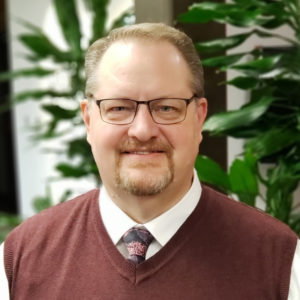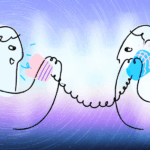
Brett Heintzman
Light + Life Communications Director
Brett Heintzman is the publisher of Light+Life through his role as the communications director of the Free Methodist Church – USA, which he also serves as the co-director of the National Prayer Ministry. Visit freemethodistbooks.com to order his books “Becoming a Person of Prayer,” “Holy People” (Volume 1 of the “Vital” series), “Jericho: Your Journey to Deliverance and Freedom” and “The Crossroads: Asking for the Ancient Paths.”
by Brett Heintzman
Have you ever been frustrated because someone misinterpreted what you said?
Bugs Bunny, in the classic animated cartoon “Forward March Hare,” is a prime example. “I want every one of them chickens cleaned and dressed for the officers’ dinner dance tonight,” says the sergeant, to which Bugs replies with a salute, “Aye aye, sir!” Cut to the next scene where Bugs enters the sergeant’s office and proudly proclaims, “The chickens is ready, your honor. All cleaned and dressed for dinner, sir.” Now wait for it. The shot expands to reveal an entire yard full of chickens elegantly clad in tuxedos and top hats.
The sergeant did say to dress them for dinner, right?
Jesus said, “go and make disciples of all nations” (Matthew 28:19a), yet we’ve put tuxedos and top hats on many a chicken in our response. We think we know what Jesus meant, but there really is only one example to follow, and that is how Jesus discipled the twelve. What Jesus did with twelve ordinary men was miraculous. Well, actually it was normal in discipleship standards. Consider that, as the twelve heard Jesus tell them to go and make disciples, they would have had only one method by which to base their obedience: their own discipleship.
Let’s put ourselves in the three-year discipleship plan of the original twelve and consider what ministry looked like for them as a result. They were drawn into the miraculous. Almost immediately they began to witness miracles and then were sent to perform them. Friends, if the miraculous was the thread running through the three-year plan of discipleship for the twelve, how would they have viewed discipleship any differently for those they discipled?
Somewhere along the way we veered off the path of the miraculous restoration of broken people, healing of the sick, providing sight for the blind, and opening the ears of the deaf for educational and fellowship experiences that revolve around a culture of church gathering. Somehow we began to see miracles as a benefit of membership for those in the church rather than a splashing of heaven on the landscape of a broken earth.
Where there is much brokenness, there is much opportunity. Disciples see this and hunger for restoration and reconciliation to replace decay and division. Disciples set aside their own comfort for the peace of others, wear the chains of prison for the freedom of others, and endure scorn for the glory of Christ Jesus. Let’s consider three things to lay down — things that are likely barriers to our full participation as disciples of Jesus that mirror the lives and actions of the twelve — and three things to take up – redefinitions of what Jesus meant discipleship to be.
Lay down your life. Be willing and open. Remember that you are a living sacrifice. Confess that your life is not your own, that you were bought with a price (1 Corinthians 6:20). Present yourself to God as an instrument to be used in the ways of God’s choosing.
Lay down your needs. Seeking miraculous solutions for our own needs is often the shackle that restrains us from ministering to others. Pray for the Lord to use you to heal others even if your healing never comes. Pray to let miracles flow through you even if your own doesn’t manifest.
Lay down your church status. Positions are nothing compared to being a servant. Put away your trophies and titles in exchange for a servant’s heart. Ask the Lord to make you a servant of all even as He was a servant of all.
Take up the role of a miracle worker. Be a follower of Jesus. Read the gospels and place yourself in the stories. Walk with the disciples into the spaces where miracles happened and ask God to be a disciple as He intended.
Take up the cross of the miraculous. Miracles earned Jesus more disdain than accolades and so it was for the twelve. There is a cross of death hidden in the resurrection of the miraculous. Tell the Lord you are ready and willing to take it up and take it on.
Take up the “loss” of heavenly gain. He must increase; I must decrease (John 3:30). Tell the Lord you are ready to experience loss for the sake of heaven’s gain.
Imagine the Lord’s voice teaching you to pray, “Your kingdom come, your will be done on earth as it is in heaven” (Matthew 6:10). Now picture yourself in the home of a stranger, doing what Jesus asked of you as you heal a sick person with Christ’s power and authority, explaining that the kingdom of God has come to that house. The dots connect. “This is what it means for heaven to come to earth! This is why we’re supposed to pray in this way! This is what it means for us to be fishers of people — salt and light — a city on a hill,” you ponder with great mysterious delight.
What do you think Jesus said about miracles? About discipleship? About what He really asks of you and me as His representatives on earth?
His viewpoint is the only one we need. +

Brett Heintzman
Light + Life Communications Director
Brett Heintzman is the publisher of Light+Life through his role as the communications director of the Free Methodist Church – USA, which he also serves as the co-director of the National Prayer Ministry. Visit freemethodistbooks.com to order his books “Becoming a Person of Prayer,” “Holy People” (Volume 1 of the “Vital” series), “Jericho: Your Journey to Deliverance and Freedom” and “The Crossroads: Asking for the Ancient Paths.”









